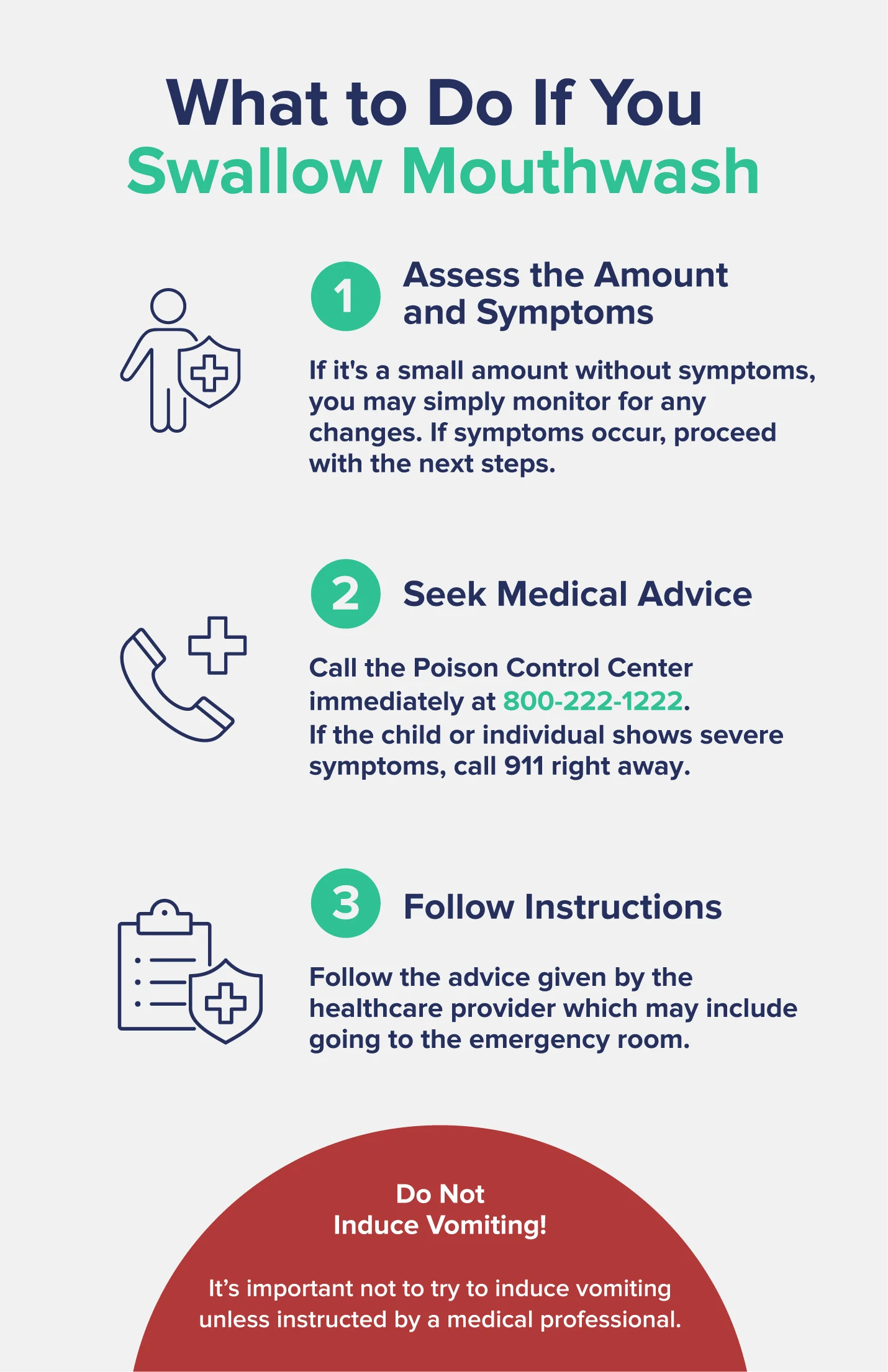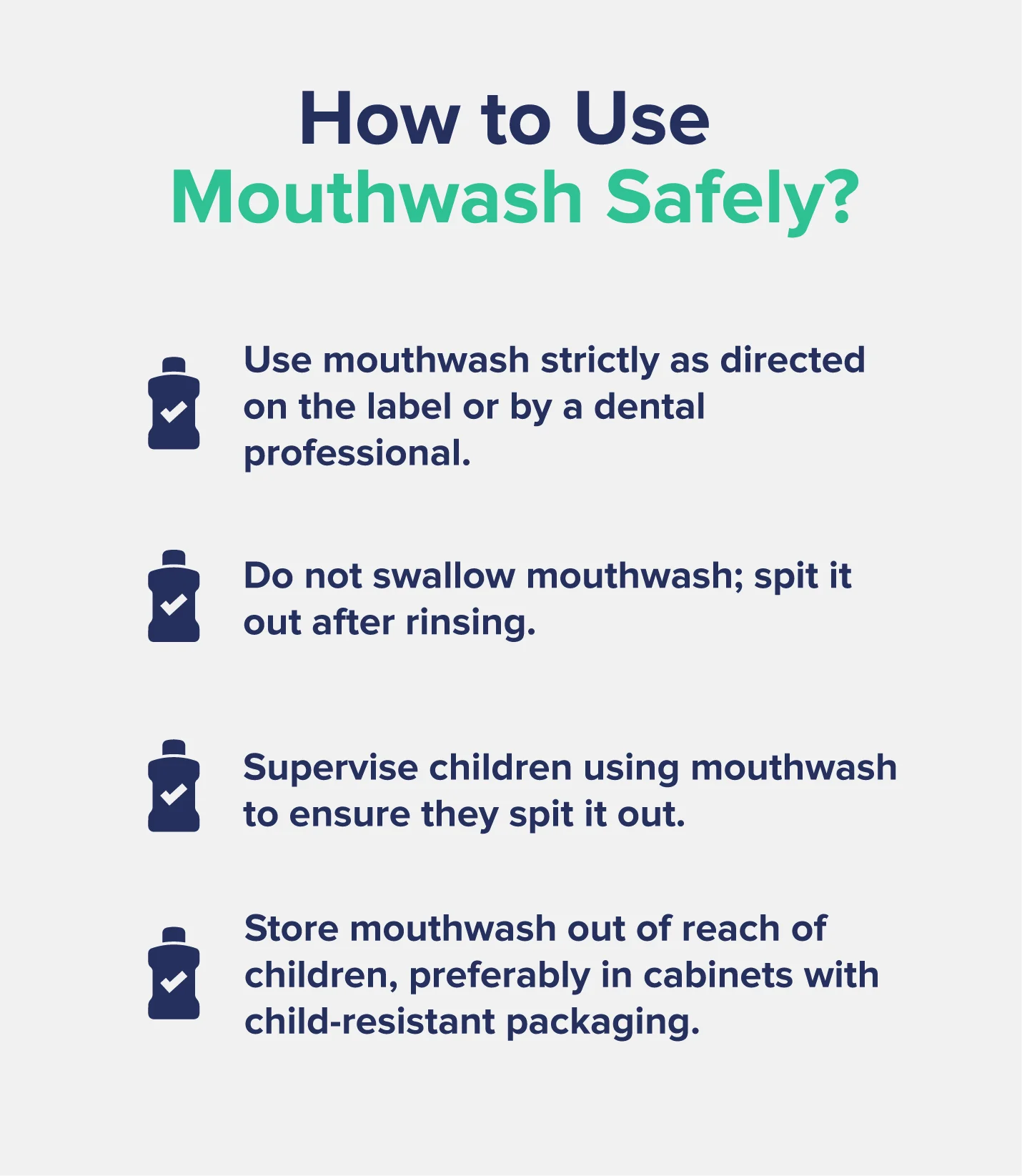Talk to a Registered Dietitian and use INSIDER20 for 20% off!
Talk to a real Dietitian for only $99: Schedule Now
Everyone loves that fresh mouth feeling after a swish of mouthwash—but those ingredients that fight bad breath and kill bacteria can also be toxic if ingested.
Although most mouthwash ingestion is not purposeful, many people can swallow some of it accidentally—or worse, maybe your child got into your medicine cabinet and thought it was a fun drink you’ve been hiding.
If you or your child accidentally consumed mouthwash, here’s everything you need to know about the potential symptoms of mouthwash overdose, when to call a doctor, tips for using mouthwash safely, and the top ingredients that are toxic when ingested.

While mouthwash is great for killing germs, freshening stale or bad breath, and fighting tooth decay or gum disease, it is certainly not great for drinking.
Although the medicinal taste of most mouthwashes will deter people from drinking them, kids’ mouthwashes can have fun colors and sweet, fruity flavors that make them more appealing—or they may rifle through your medicine cabinet and drink your adult-intended mouthwash on accident.
Given their smaller size, any amount swallowed by a child could have a more serious effect than the same amount consumed by an adult.
Therefore, if your child swallows mouthwash in any quantity, call the Poison Control Center immediately, where they will ask you details about which mouthwash they drank, how much, if they are experiencing symptoms, and the next steps to take.
The Poison Control Center’s toll-free hotline is 800-222-1222, with operators available 24/7.
If you’re an adult, swallowing a small quantity of mouthwash is unlikely to cause any significant adverse effects—but larger amounts could produce toxic effects like dizziness, drowsiness, trouble breathing, or convulsions in severe cases.
So what constitutes “a little” versus “a lot”? When it comes to children, any amount of mouthwash consumed is considered potentially dangerous.
As an adult, swallowing the small leftover amount in your mouth after you spit out your rinse or drinking water right after rinsing and taking the residual amount with it will be fine.
While there is no recommended minimum amount of mouthwash that is safe to consume, if you manage to swallow more than the usual capful (perhaps by being distracted by pets or kids) or intentionally drink more than a capful, keep a close eye on any potential symptoms and be ready to call a doctor or the Poison Control Center or head to the Emergency Room.
Minor symptoms of swallowing a lesser volume of mouthwash might include:
Severe symptoms of swallowing large quantities of mouthwash can cause symptoms similar to drinking alcohol excessively, including:
If dizziness, slurred speech, palpitations, or vomiting are noticed, call the Poison Control Center. Call 911 immediately if someone is experiencing difficulty breathing or convulsions, which are symptomatic of a mouthwash overdose.
It’s important to remember that you should not make yourself vomit if you swallow too much mouthwash.
If you are an adult and ingested a small amount of mouthwash, there’s likely no reason to panic. You may experience digestive issues or throat irritation, but you’ll probably be fine.
If you’re unsure, you can always call your doctor for their opinion based on the amount you consumed.
However, a more considerable amount (about two ounces/capfuls or more for adults) should warrant a call to the doctor and potentially the Poison Control Center, where they can instruct you further based on what mouthwash you drank and how much.
If you experience any of the severe symptoms listed above, call your doctor, the Poison Control Center hotline, or 911 if the symptoms are life-threatening (convulsions or breathing problems).
Similarly, a child who drank any amount of mouthwash will need to be treated immediately, as their bodies are smaller and cannot handle the same amount as adults.
At the Emergency Room, the course of treatment for a mouthwash overdose depends on how much was ingested. Common treatment options might include:
The bottom line is that if you’re unsure if you swallowed too much mouthwash, there is no harm in calling the Poison Control Center for more personalized advice.
The same ingredients that help kill bacteria and freshen breath can also be harmful if ingested.
Alcohol-based mouthwashes (the kind that burns when you rinse) tend to be the most harmful when consumed. You may see alcohol listed as ethanol or ethyl alcohol on a label.
When consumed, the most harmful and toxic mouthwash ingredients include:
Although kid-friendly mouthwashes typically do not contain alcohol, many still have fluoride or other ingredients that can upset their stomachs or cause other symptoms.

If you have children, consider avoiding mouthwash until they are older and able to spit. The American Dental Association recommends that children under six not use mouthwash of any kind—even if it says it’s “kid-safe.”
When kids are old enough to start using mouthwash, they should always be supervised and monitored to ensure they do not swallow it.
As an adult with kids, you should purchase mouthwash with child-resistant packaging and keep it on high shelves that your child cannot access.
Since 1995, mouthwashes containing at least 3 grams (0.11 ounces) of ethanol per package must have child-resistant packaging.
However, even an alcohol-free mouthwash can contain potentially harmful ingredients to children.
If you drink water after using mouthwash (meaning there are still minor amounts left in your mouth), you will likely be fine from a safety perspective. When ingested by adults, small quantities of mouthwash ingestion are likely no cause for concern. However, many types of mouthwash do not recommend drinking fluids after using it because it may wash away the active ingredients and reduce its effectiveness.
If your child swallowed mouthwash, call the Poison Control Center immediately at 800-222-1222. If they are experiencing life-threatening symptoms like difficulty breathing, call 911.
Most mouthwashes are not safe to swallow. However, Listerine Go! Chewable Tabs (which are not technically mouthwash) are alcohol-free and safe to consume. Plus, Spry Xylitol Kid’s Mouth Rinse states it’s safe to swallow, although it’s not intended to be consumed.
Most adults who swallow mouthwash accidentally are fine (in small amounts, at least). For children, any amount of mouthwash swallowed is too much. For adults, there is no recommended minimum amount that is safe to ingest. However, a small residual amount of mouthwash or about one capful will cause no major side effects—but you may experience digestive issues, nausea, or throat irritation. If you consume significant amounts (perhaps two ounces or more), keep an eye out for symptoms like dizziness, slurred speech, or increased rate, and call the Poison Control Center. If you have severe health issues or symptoms like convulsions or difficulty breathing, call 911.
Yes, swallowing too much mouthwash can be fatal, depending on the ingredients of the mouthwash and the quantity consumed. However, this is much more likely to occur in children than adults. While rare, adults can also die from a mouthwash overdose, as seen in this case report in which a 45-year-old man died after consuming almost three liters of mouthwash.